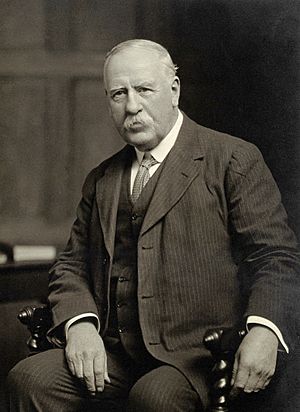Watson Cheyne facts for kids
Quick facts for kids
Sir William Watson Cheyne
|
|
|---|---|
 |
|
| Born | 14 December 1852 |
| Died | April 19, 1932 (aged 79) |
| Nationality | Scottish |
| Education | University of Aberdeen |
| Awards | Lister Medal (1924) |
| Scientific career | |
| Fields | Bacteriology |
Sir William Watson Cheyne (born December 14, 1852 – died April 19, 1932) was a very important Scottish doctor. He was a surgeon, which means he performed operations. He was also a bacteriologist, someone who studies tiny living things called bacteria. Sir William was a pioneer in using "antiseptic" methods during surgery in the United Kingdom. This means he helped make sure operations were clean to stop infections.
Contents
Early Life and Education
William Cheyne was born at sea near Hobart, Tasmania. His mother, Eliza, passed away in 1856 when he was very young. Because of this, his grandfather, Rev. William Watson, raised him. Later, his aunt and uncle-in-law took care of him in Fetlar, Scotland.
In 1864, he started school at Aberdeen Grammar School. He then went to King's College, Aberdeen in 1868 to study arts. However, he did not finish this degree.
His aunt and uncle wanted him to become a minister. But William, like his father, wanted to go to sea. He decided that if he became a doctor, he could join the navy. So, in May 1871, he began studying medicine at the University of Edinburgh. He finished his medical and surgical degree in 1875.
Medical Career and Discoveries
Working with Joseph Lister
In 1876, Cheyne became the house surgeon for Joseph Lister. Lister was a famous British doctor who started using antiseptic methods in medicine. Antiseptic means using special chemicals to kill germs and prevent infections.
In the 1870s and 1880s, many scientists in France and Germany were studying bacteria. But in Britain, only a few people, like Lister, were doing this important work. In 1877, Cheyne and Lister moved to King's College Hospital. Cheyne worked there as an assistant surgeon. Later, from 1880 to 1917, he became a surgeon and a professor of surgery.
Cheyne strongly believed in Lister's antiseptic surgical methods. He was also greatly inspired by the work of a German bacteriologist named Robert Koch. Koch studied how bacteria caused diseases.
Bringing New Ideas to Britain
Cheyne translated one of Koch's important books into English in 1880. This helped more doctors in Britain understand and accept the study of bacteria. In 1882, Cheyne published his own book called Antiseptic Surgery: Its Principles, Practice, History and Results. Later, in 1925, he wrote Lister and His Achievement.
In 1886, Cheyne visited Koch's laboratory in Berlin to learn more about his methods. He also did trials on a substance called tuberculin. He found that giving small, repeated doses helped patients with certain conditions. This work was seen as a very important step in France. In 1894, he was chosen as a Fellow of the Royal Society, a group of top scientists.
Military and Public Service
Serving in Wars
Cheyne served as a consulting surgeon for the British military during the Second Boer War in South Africa from 1900 to 1901. His commander, Lord Roberts, praised him for his "invaluable service" and his hard work helping wounded and sick soldiers.
In 1910, he became an Honorary Surgeon to King George V. When World War I began in 1914, he became a consulting surgeon for the Royal Navy. He was briefly a temporary Surgeon General in 1915. Later, he was made Surgeon Rear-Admiral and received the KCMG honor.
Leadership and Recognition
From 1914 to 1916, Cheyne was the President of the Royal College of Surgeons of England. In 1924, he received the very first Lister Medal. This award recognized his major contributions to surgical science. The next year, he gave the first Lister Memorial Lecture. He was also made a baronet in 1908, which is a special title.
Political Role
In 1917, Cheyne was elected as a Unionist Member of Parliament (MP). He represented the universities of Edinburgh and St Andrews. In 1918, he represented the Combined Scottish Universities. He held this position until he stepped down in 1922.
Later Life
In 1919, he was appointed Lord Lieutenant of Orkney and Shetland. This was a special role representing the King in those areas. Cheyne left London in the early 1920s and retired to Fetlar. He resigned from his Lord Lieutenant role in 1930. He passed away in 1932 at the age of 79 after a long illness.
Important Works
- Antiseptic Surgery: Its Principles, Practice, History and Results (1882)
- Lister and His Achievement (1885)
- Manual of the Antiseptic Treatment of Wounds (1885)
- Manual of Surgical Treatment, 7 volumes (1899–1903; with F. Burghard)
Surgical Instrument Named After Him
Sir William Watson Cheyne is also remembered because a surgical tool is named after him. It's called the 'Watson Cheyne Dissector'. Surgeons use this tool in operations to help remove plaque from inside blood vessels. The tool usually has two different ends: one like a probe and one like a small lifter.
See also
- List of honorary medical staff at King Edward VII's Hospital for Officers
 | Kyle Baker |
 | Joseph Yoakum |
 | Laura Wheeler Waring |
 | Henry Ossawa Tanner |

